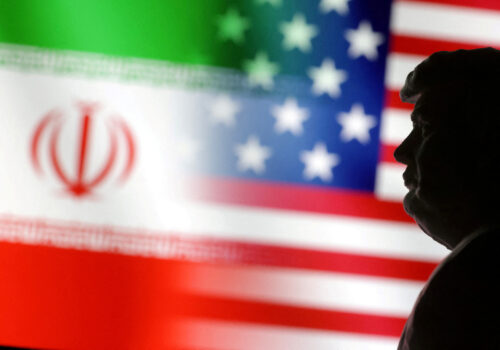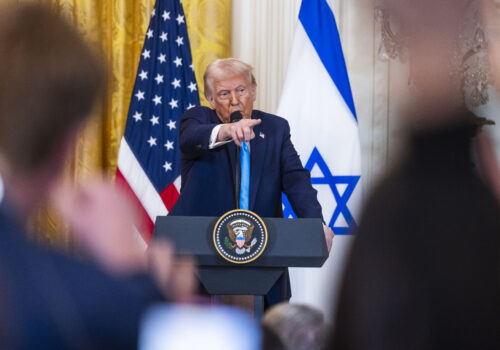Why Israel will resist any US-Iran nuclear deal
The Israeli government and Prime Minister Benjamin Netanyahu welcomed the election of US President Donald Trump for a variety of reasons, but the most important of them was his stance on Iran. It seemed that Israel hoped that the president’s election would open a window of opportunity for a military strike against Tehran’s nuclear sites.
The massive reinforcement of Washington’s regional military presence, and threats from senior officials that Tehran will face serious consequences if it does not completely dismantle its own nuclear program, indicated to Israel that the United States is serious about implementing military force and intends to attack Iran, or at least back up an Israeli attack.
However, Trump’s statement of intent to open nuclear negotiations with Iran in his meeting with Netanyahu last month caught the Israeli government by surprise. Moreover, after the rounds of talks between Tehran and Washington, it is clear that both parties are indeed interested in reaching an agreement. In the background, it seems that the US has given up its basic demand for dismantling the enrichment sites in Tehran and is content with restrictions on the existing program.
These negotiations with Iran have displayed a significant divide between Washington and its ally Israel, one that also sits at the center of Netanyahu’s staunch opposition to the 2015 nuclear deal achieved under former president Barack Obama. From the Israeli perspective, the nuclear program is indeed a problem, but the solution lies not only in attacking Tehran’s nuclear sites but in changing the regime. Nothing threatens Israel more at present than such an agreement, even one that would significantly reduce Tehran’s ability to develop a nuclear bomb, because it would deal a severe blow to the Israeli desire to see the Iranian regime fall.
SIGN UP FOR THIS WEEK IN THE MIDEAST NEWSLETTER
Netanyahu sent his own envoys several times to meet with US Special Envoy Steve Witkoff and his team to dissuade them from negotiating a deal, but those efforts failed.
From Washington’s perspective, it is vital to limit Iran’s nuclear program so that it cannot produce nuclear weapons. This has been the primary—if not the only—goal of the United States, across both Democratic and Republican administrations with respect to Iran, not outright regime change.
This divide with the Israelis is mirrored with respect to the sanctions regime against Tehran. In Israel’s view, the sanctions are a means to achieve regime change there, while Washington has sought designations as a point of leverage in the nuclear field.
Therefore, even if the talks between Witkoff and Iranian Foreign Minister Abbas Araghchi will indeed conclude in a “good” agreement: one that will prevent Iran from having a bomb by limiting Iran’s enrichment capacity to 3.67 percent without sunset clause, force Tehran to export its current stock of enriched material, and require it to dismantle its advanced centrifuges and accept close and meaningful oversight “without exit clauses,” Israel will see this agreement as a dangerous one.
That is not only because it is a deal that will not include restrictions on other components of the Iranian threat, such as its missile array or its support for its proxies throughout the Middle East, but mainly because it will strengthen the current regime in Tehran—including the significant economic relief that the regime will receive, as well as the renewed political legitimacy following an agreement with Washington. In addition, the economic improvement in Tehran will allow its leadership to upgrade its security system and even increase support for its proxies deployed in the Middle East. In the Israeli view, the “golden opportunity” to topple the regime, given its weakness, will disappear.
Further, a nuclear agreement between Tehran and Washington further diminishes already dwindling Israeli leverage with the new US administration. Israel will have great difficulty taking military action against Iran after a nuclear agreement with the United States.
Even at the political level in Israel, there is a consensus regarding the need for an attack on Iran. Netanyahu, who cannot afford to be bypassed by the opposition leaders who also present an extreme position regarding Iran, cannot be perceived as supporting the deal, even if secretly he thinks differently The proof that Israel does not really want a deal with Iran concerns its demand for the implementation of the “Libyan model” in the Iranian context, that is, the dismantling of all enrichment infrastructure in Iran. As the US administration also knows, this position is a red line in Tehran’s eyes, and there is no chance that Tehran will accept it. Israel may be hoping that the administration will adopt this position with the understanding that Iran will not accept it, thus opening the way for examining “other options” in dealing with the Iranian program.
In the background, there is a more fundamental gap between Israel and the United States, and this concerns the question of the Iranian regime’s ambitions for its nuclear program, as well as the effectiveness of non-kinetic moves to deal with Tehran’s nuclear program. The Israeli Prime Minister’s assumption and claim that Tehran seeks to produce a nuclear bomb have been rejected time and again by US intelligence officials, who do not accept this claim and emphasize that there is no evidence that the Iranian leader has decided to build nuclear weapons. Moreover, while Netanyahu hails the actions Israel took to prevent Iran from producing nuclear weapons, US intelligence has claimed several times that the actions Israel took not only prevented Iran from making progress on the nuclear issue but also, in many ways, advanced Tehran in its enrichment program in an unprecedented way.
This gap is significant because it is the basis that leads the US administration to seriously examine the diplomatic option, especially since American intelligence estimates that an attack on Iran would mean a regional war, contrary to various assessments in Israel that are based on Tehran’s current weakness, and its inability to respond significantly to any attack. The fact that Iran is certainly weak today, in light of the weakening of its proxies and the results of the October 26 Israeli attacks, is accurate. US intelligence, however, asserts that the regime still has enough capabilities to attack US forces in the Middle East, which could lead the region into a broad campaign.
The bottom line is that Israel is expected to oppose any agreement with Iran, even one that would distance it from the option to produce a nuclear weapon. Because in Jerusalem’s view, the nuclear issue is only part of a set of problems, and the current window of time should be used to act to overthrow the Iranian regime. Unfortunately for Israel, it is doubtful whether the US administration is at that point, and this gap could cause serious tension between Washington and Jerusalem. As negotiations stand, it is questionable whether Israel can do anything about it.
Danny Citrinowicz is a nonresident fellow with the Atlantic Council’s Middle East Programs. Citrinowicz is also a fellow at the Institute for National Security Studies.
Further reading
Fri, Apr 11, 2025
The Iran nuclear talks are Trump’s decisive moment on military strikes
MENASource By Daniel B. Shapiro
Within a relatively short time, Donald Trump is likely to face the decision point on whether or not to pursue a military strike against Iran.
Fri, Apr 25, 2025
One hundred days of Trump’s Middle East policy: money, mediation, and military force
MENASource By Stefanie Hausheer Ali
President Trump’s desire for more investment in the United States plays to the strengths of Saudi Arabia and the United Arab Emirates.
Thu, Apr 10, 2025
Iran is at an unprecedented crossroads over its nuclear program
MENASource By Alex Plitsas
The Middle East is experiencing a rare re-alignment that puts Iran in an unprecedently vulnerable position.
Image: Israeli Prime Minister Benjamin Netanyahu holds a press conference with Defense Minister Yoav Gallant and Cabinet Minister Benny Gantz (not pictured) in the Kirya military base in Tel Aviv , Israel , 28 October 2023. ABIR SULTAN POOL/Pool via REUTERS


